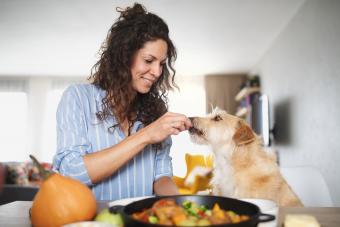
While carving a bird during the holidays, you might wonder if dogs can eat turkey. The answer is yes, with some restrictions. Turkey meat is safe for dogs if given in moderation and prepared correctly. Some portions of this poultry, however, should never be given to a pet. If you'd like to include Fido in your family feast, it's important to understand how much and what parts of the turkey are safe for your dog.

Turkey Is a Safe Treat for Your Dog
Turkey meat is a great source of protein and contains essential nutrients like vitamins B12 and B6, niacin, and zinc. It's also relatively low in fat and easily digestible. For this reason, many commercial canine products use turkey as a primary ingredient.
Turkey also contains tryptophan, which is commonly credited with making people sleepy after a turkey-loaded meal. Dogs who are deficient in this naturally occurring amino acid have been shown to portray aggression and anxiety. Some experts speculate that tryptophan supplementation could make a dog calmer, but most studies have been inconclusive.
The big concern when giving your dog turkey involves its preparation. Holiday turkeys are typically doused in oils, butter, herbs, and seasonings to create a tasty main course. Unfortunately, these additions can upset your dog's stomach or may even be toxic to them. In addition, deli turkey is often loaded with sodium and preservatives.
How Much Turkey Can Your Dog Have?
Although turkey has health benefits, it's possible to have too much of a good thing. As a rule, treats should be limited to no more than 10 percent of a dog's total daily caloric intake (the other 90 percent should come from a balanced canine-formulated food). That means a dog that weighs around 20 pounds should have no more than one ounce of turkey meat in a day. That's comparable to a piece the size of your thumb.

Not to mention, eating too much turkey can potentially lead to digestive distress like diarrhea or vomiting, weight gain, or pancreatitis. Begin with just a small piece to see how it sits with your dog. Additionally, try to stick with the white meat, as this is lower in fat and more easily digestible.
How to Prepare Turkey for Your Dog
When preparing turkey from scratch for your dog, there are a few things to keep in mind.
- Opt for ground turkey or boneless and skinless breast.
- Avoid using oil or butter to baste the turkey. Boiling the meat is the best way to keep it lean.
- Make sure you cook the turkey thoroughly, as raw poultry can carry harmful salmonella.
- Do not use any salt or seasonings.
- If you can't find boneless, skinless meat, remove the skin and all bones before serving.
- Cut the turkey into small pieces to prevent choking.
- Offer a small amount as an occasional treat, or use it to cook homemade dog food.
However, if you'd like to give your dog some of your turkey feast, use caution. Consider the way the turkey was cooked. Brined turkeys may have too much sodium for your pup, and fried turkey contains too much fat. Avoid pieces with spices, as these can upset your dog's stomach. Seasonings or garnishes like onion and garlic are toxic to pups, so skip these as well. Finally, always remove any skin and all bones.
Dangerous Parts to Avoid
Although the meat is safe, there are a few components of the turkey that can hurt your dog if ingested.
- Bones. Much like chicken bones, turkey bones are not safe for dogs. These brittle bones can easily splinter into sharp shards, which can damage your dog's mouth or throat. Worse, the sharp fragments can puncture the inside of their intestines while moving through, causing life-threatening complications. And even if they don't break, bones can create a blockage in your dog's intestines, which could require surgery.
- Skin. Crispy turkey skin is no doubt delicious, and the main reason is thanks to its high fat content. Fatty foods can cause dogs to have gastrointestinal upset including vomiting or diarrhea, and can even lead to inflammation of the pancreas, called pancreatitis.
- Neck. Although some owners elect to give their dogs turkey necks, most experts recommend against it. The neck still contains bones that can be harmful to your dog, and it's also the perfect size and shape to become lodged in a dog's throat. Veterinarian Dr. Jodie Gruenstern, DVM, CVA states, "Even most hardcore bone feeders agree that turkey necks should not be fed to dogs."
Dog Food Allergies
It's important to note that some dogs have food allergies. Typically, this is an allergy to the protein source within their diet. The most common reactors are beef and chicken. However, it is possible for a dog to have an allergy to turkey. If you know that your dog has food allergies, it might be best to skip the turkey and give them hydrolyzed or novel protein treats instead.
Turkey As a Dog Food Staple or Treat
Many commercial and homemade formulas use turkey as a staple protein source. If you're interested in using this poultry to make your dog's food, find a dog-specific recipe so they receive a balanced diet. Numerous tasty treat recipes that use turkey are also available, and some even call for leftover holiday turkey!

Limit How Much Turkey Your Dog Gobble Gobbles Up
In moderation, plain turkey meat is a healthy treat, and it can be used to supplement your dog's food. Just be cognizant of how it was prepared and whether it contains any toxic ingredients. If your dog gets ahold of turkey bones, contact your veterinarian right away for guidance.







